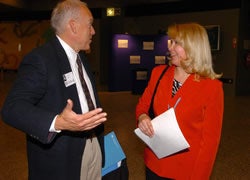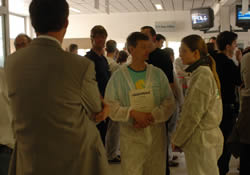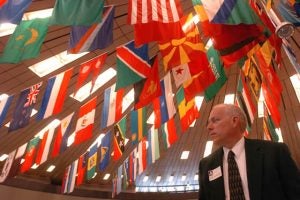Students meet with international nuclear experts
VIENNA, AUSTRIA — Nuclear power is on the upswing, with anywhere from 16 to 140 new power plants possible worldwide within the next two decades, and a group of East Carolina University public health students met today in Vienna with international experts to discuss the health issues surrounding atomic energy.
Soaring prices for oil and natural gas and worries about pollution from fossil-fuel power plants has the public ready to take a new look at nuclear power, officials of the International Atomic Energy Agency told the students. With those new facilities will come public anxiety about what might happen if things go wrong, as they did at the Chernobyl nuclear power station 20 years ago this week.

Dr. Daniel Sprau speaks with Irina Kouzmina, a physicist and safety assessment specialist with the International Atomic Energy Agency. Sprau is leading a group of ECU students on a tour of the IAEA and the closed Chernobyl nuclear power station, which exp
Students in a graduate-level course at ECU have been studying nuclear power this semester, and their studies will culminate with a visit to that shuttered nuclear power plant Thursday.
Dr. Daniel Sprau, associate professor in the ECU Department of Health Education and Promotion, teaches the course and organized the trip. Sprau has worked with the IAEA in the past.
“The resurgence of nuclear power ought to include local public health folks,” Sprau said. “Unfortunately, what we’ve seen in the U.S. is the nuclear engineers don’t talk to the local people.”
ECU’s program sparked interest among officials of the IAEA, the United Nations’ nuclear watchdog organization.
“Most people are not willing to visit those areas that are not absolutely clean, but you are professionals and are treating it in a professional way,” Irina Kouzmina, a physicist and safety assessment specialist with the IAEA, told the group.
Kouzmina set up a slate of presentations by IAEA experts on nuclear power, its future, its safety and the health effects of the Chernobyl disaster.
One of the speakers was Voldomyr Berkovskyy, an environmental assessment specialist and a native of Kiev, Ukraine, about 60 miles from the Chernobyl facility; at that time, Ukraise was part of the Soviet Union. As a radiation physics engineering student, he helped construct the No. 4 reactor. A steam explosion blew open the reactor building early on April 26, 1986 after a routine test went awry, spewing large amounts of radiation into the atmosphere. Later that year, he was invited to join the Scientific and Engineering Center for Nuclear and Radiation Safety, a group the Soviet Union formed in the wake of the disaster. In that role, he was a “liquidator,” one of thousands of people who worked to clean up, assess and seal the destroyed reactor.
When the explosion occurred, Soviet officials kept quiet, not beginning evacuations until the following day. According to Berkovskyy, that lack of information caused panic, but so, too, would telling in detail what had happened, because officials weren’t sure what would happen next.
“The first ten days, the situation was unpredictable,” Berkovskyy said.
Another speaker, Akira Omoto, director of the IAEA division of nuclear power, said that while the number of nuclear plants has fallen since the 1980s, improvements in efficiency mean the plants are producing more power. Twenty-seven new plants are planned around the world, he said, with as many as 140 new ones possible by 2020.
While the ECU students were at the IAEA, a group of Greenpeace protesters appeared with a banner reading, “IAEA: Don’t Whitewash Chernobyl.” An IAEA report released last year said 56 people died in the disaster, and another 4,600 may die prematurely due to cancer or other ailments caused by the radiation. A Greenpeace report released last week put the number of eventual deaths at 90,000.
The ECU group leaves for Kiev Tuesday, then returns to Greenville Friday. Their trip was paid for largely with funds Sprau raised from energy companies. Among the six students on the trip is Michael Apple of Washington, who will graduate with a bachelor’s

Greenpeace protesters voice their concerns about nuclear power at the International Atomic Energy Agency headquarters in Vienna April 24. Photo by Cliff Hollis

Dr. Daniel Sprau led a group of ECU students to talks at the International Atomic Energy Agency headquarters in Vienna April 24. Photo by Cliff Hollis